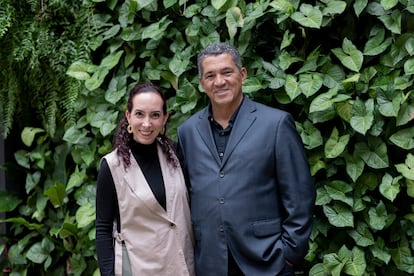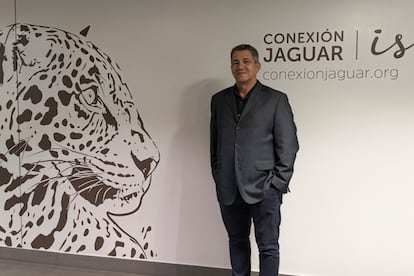Meet the colonel who protects the largest jaguar reserve in the world
For the past 30 years, Colonel Angelo Rabelo has been fighting against animal-trafficking and poaching in the Pantanal, the largest freshwater wetland on the planet, which lies between Brazil, Bolivia and Paraguay

Everyone knows Angelo Rabelo in the Pantanal, the largest freshwater wetland in the world. Around 30 years ago, they remember him wearing a military uniform, when he used to command the Environmental Military Police of Mato Grosso do Sul (Brazil), training almost a hundred park rangers. Today, the retired colonel is the leader of the Homem Pantaneiro Institute, a civil society organization that protects the ecosystem, manages protected areas and supports local communities as they preserve the natural wealth of their territories.
This is an extremely biodiverse space, lying between Brazil, Bolivia and Paraguay. It’s also home to the largest jaguar refuge in the world. For the former colonel, changing hats wasn’t difficult: “I’ve been combatting poaching and illegal trafficking of these felines all my life, in one way or another.”
Colonel Rabelo graduated as a brigade officer in the Brazilian Armed Forces and earned a degree in Law from Dom Bosco Catholic University. He also got a master’s degree in Public Security Management from the Center for Advanced Security Studies. In a video interview with EL PAÍS, he recalls how he’s been implementing sustainability programs for decades, in both the public and private sectors.
His experience in the environmental field led him to meet with President Luiz Inácio Lula da Silva a few days before the COP28 was held in Dubai. “He brought together an expert from each ecosystem in Brazil. He wanted to understand them all, he didn’t just want to talk about the Amazon. He wanted to understand Brazil in all its richness,” he explains.
One of the things that Colonel Rabelo lobbied for was that the “Pantanal receive the same attention that the Amazon gets. And that work not only be done on reforestation, but also on the recovery of biodiversity.”
The former colonel — and the entire scientific and environmental community — unabashedly celebrates the change of government in Brazil. “I would say that we’re living in an exceptional moment, with the Lula administration, Minister [of the Environment] Marina [Silva] and the governors. The one from Mato Grosso do Sul, for example, is a biologist. Everything is changing,” he adds. For Rabelo, during Jair Bolsonaro’s mandate (2018-2022) “many [environmental] programs were violently destroyed.” He says that now is a great time to recover what was lost.

The carbon market: a way to preserve the jaguar
Among Rabelo’s many priorities is that the Pantanal continues to be the largest refuge for jaguars in the world. Of all the third-largest felines on the planet, half live in this territory, but fires and deforestation seriously threaten their sanctuary. In the 1980s and 1990s, the main threats to them were animal-trafficking and poaching. Today, however, the main problem is the presence of landowners and ranchers, who see the jaguar as a danger to their livestock. This is why the Colonel — as he’s known in Brazil — has been focusing more and more on maintaining a dialogue with residents and farm owners. “We go from farm to farm, proposing efficient technology that already exists, to reduce these conflicts and not wipe out the small population [of jaguars] that remains,” he explains.
This species lives in 18 countries in the Americas. It tends to be at home in ecosystems that are less than 6,500 feet above sea level, such as tropical forests, mountain forests, tropical savannas and mangroves. Due to human intervention, jaguars have disappeared from 46% of their original territory and are extinct in countries such as El Salvador and Uruguay, according to the World Wildlife Fund (WWF). In the rest of the continent, the species is in a state of near threat, with its populations decreasing. This is according to data from the Red List of Threatened Species, released by the International Union for Conservation of Nature (IUCN).
It’s within this framework of challenges described by Colonel Rabelo that the Jaguar Connection project emerged in Brazil. This initiative is promoted by the ISA Group, a Colombian energy company that has a presence throughout the region. The program supports the mitigation of retaliatory hunting by implementing a human-feline coexistence plan. The goal is to work towards a healthy coexistence between rural communities and wildlife. In addition, the firm provides technical and economic support to the best forestry initiatives throughout the Jaguar Corridor, to be able to issue and market certified carbon credits.
Recently, the ISA Group announced the creation of the REDD+ Project Serra do Amolar, in the Brazilian Pantanal UNESCO Biosphere Reserve. It’s the first area to be certified with more than 231,000 approved carbon credits, after an audit and review process was conducted by VERRA, the main carbon standard for voluntary markets. These credits will be sold internationally.
María Adelaida Correa — the corporate director of Sustainability at the ISA Group — emphasizes the relevance of the jaguar for ecosystems. The jaguar is “an umbrella species. That is, the fact that the jaguar continues to live in its ecosystem is a sign that the system is healthy, that the food chain that follows it is present.”

When asked about how to guarantee that the economic benefits of this carbon market remain in the local communities, Coronel is blunt: “Part of the carbon markets aren’t working correctly, it’s true. But we cannot discredit this enormous opportunity… it would be irresponsible. Climate change is coming at us hard and this is a great opportunity.”
For Rabelo, environmental education is very important, but it’s not enough. “The market had to get involved in the protection of ecosystems. Of course, companies intend to profit, but they’re also going to contribute to society,” he concludes.
Sign up for our weekly newsletter to get more English-language news coverage from EL PAÍS USA Edition
Tu suscripción se está usando en otro dispositivo
¿Quieres añadir otro usuario a tu suscripción?
Si continúas leyendo en este dispositivo, no se podrá leer en el otro.
FlechaTu suscripción se está usando en otro dispositivo y solo puedes acceder a EL PAÍS desde un dispositivo a la vez.
Si quieres compartir tu cuenta, cambia tu suscripción a la modalidad Premium, así podrás añadir otro usuario. Cada uno accederá con su propia cuenta de email, lo que os permitirá personalizar vuestra experiencia en EL PAÍS.
¿Tienes una suscripción de empresa? Accede aquí para contratar más cuentas.
En el caso de no saber quién está usando tu cuenta, te recomendamos cambiar tu contraseña aquí.
Si decides continuar compartiendo tu cuenta, este mensaje se mostrará en tu dispositivo y en el de la otra persona que está usando tu cuenta de forma indefinida, afectando a tu experiencia de lectura. Puedes consultar aquí los términos y condiciones de la suscripción digital.









































